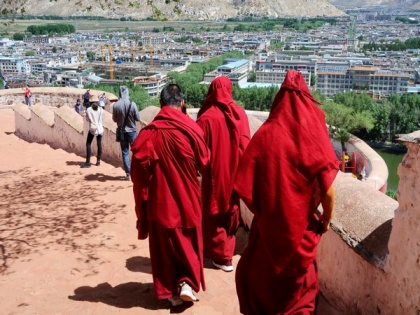Tibetan Muslim community flourishing in Srinagar
By ANI | Published: June 17, 2023 09:27 PM2023-06-17T21:27:53+5:302023-06-17T21:30:10+5:30
Srinagar (Jammu and Kashmir) [India], June 17 : A community of Tibetan Muslims is thriving in the summer capital ...

Tibetan Muslim community flourishing in Srinagar
Srinagar (Jammu and Kashmir) [India], June 17 : A community of Tibetan Muslims is thriving in the summer capital of Jammu and Kashmir, Srinagar. Most of the Tibetan refugees, after fleeing to India six decades ago, have lived and practiced their Buddhist faith at this place, situated a few hundred kilometres from Dharamshala, Voice of America (VOA) reported.
Srinagar, the most populous Muslim-majority region incorporates about 1,500 Tibetan Muslims. They have preserved its culture and traditions while endearing itself to its neighbours by, as well as, having opened restaurants serving an increasingly popular cuisine, reported VOA.
Ahmad Kamal Zarief, manager of the Lhasa Restaurant on Srinagar's Boulevard Road, said young Kashmiris are extremely fond of Tibetan dishes like Momos, which is a type of stuffed steamed dumpling.
"Most of our customers are Kashmiris," he said.
He said further the restaurant was important to his father who opened this place in 1976. "My father treasured his Tibetan roots. Tibetan cuisine served as a gateway to his ancestral village, connecting him to his family and childhood memories. Through this restaurant, my father found solace in reliving those cherished moments," he recalled.
VOA is part of the US Agency for Global Media (USAGM), the government agency that oversees all non-military, US international broadcasting.
A former principal of the Tibetan Public School in Srinigar, Amanullah Malik, said for the Tibetan Muslims, who fled after Chinese troops seized control of Lhasa following a failed uprising against Beijing in 1959, the journey to Kashmir was not so much an exodus as a return to their origins, according to VOA.
Ages ago, the community's ancestors moved from Kashmir to Lhasa where they married Tibetan women and learned their language and hence formed a distinct community. "We enjoyed the freedom to practice our religion, build our mosque and conduct business without any hindrance," Malik said.
Most of the newcomers inhabited Srinagar near the 18th-century Hari Parbat Fort, VOA reported, adding that the place has now become a thriving neighbourhood marked by many Tibetan restaurants and other signs of the residents' cultural roots.
Moreover, intercommunity marriages have taken place between Tibetans and Kashmiris but are not so common. Nighat Qazi, in her 30s, married a Tibetan man and has three children. Qazi got married in 2011 and since she married outside her community, she faced resistance from her family. "Now my family and entire clan are happy and appreciate my decision. There should be more inter-community marriages," she said.
Younger Tibetans may have given up hope of returning to their ancestral homeland, which they now claim to be under Chinese occupation. This attitude can certainly be seen in their way of living since they are adopting the customs and language of the Kashmiri people, reported VOA.
"We will always reside in Kashmir, and that is an undeniable reality. Just observe the upcoming generation. They are unaware of being sent away. While they may possess Tibetan heritage, their behavior, language, and preferences are distinctly Kashmiri," said Malik, the former principal.
Nevertheless, Zarief said, the Tibetans have preserved their national language, adding, "At home, we speak in our language, and it is one of the finest dialects of the Tibetan language."
"Throughout our existence in Kashmir, we have never been harassed. Kashmiris are great hosts and have treated us well," Zarief said.
Disclaimer: This post has been auto-published from an agency feed without any modifications to the text and has not been reviewed by an editor
Open in app